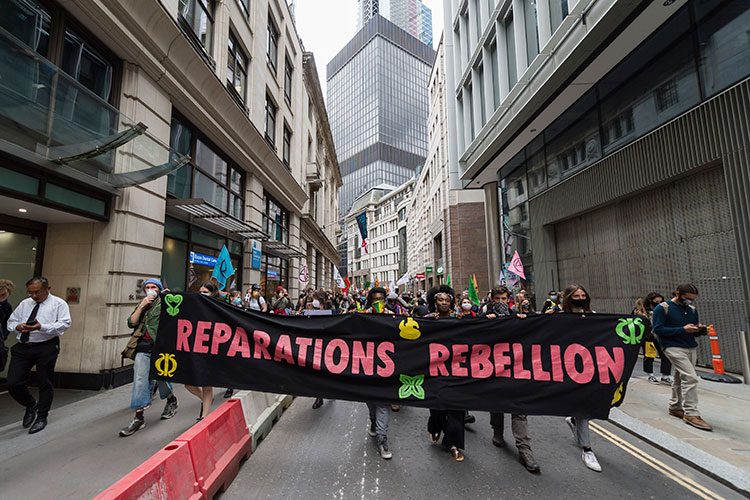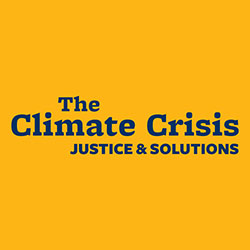What is the role of reparations in delivering climate justice?
At a panel event on Thursday, leading climate experts will discuss how reparations for slavery and colonialism are essential to building a more just and equitable world in the wake of the climate crisis
May 4, 2022
From sea level rise and extreme heat to catastrophic wildfire and severe storms, the many devasting impacts of climate change will be felt most acutely by the communities that have benefited the least from the extraction and combustion of fossil fuels — which are primarily composed of people of color and located in the Global South.
On Thursday, a panel of leading scholars will join Daniel Aldana Cohen, UC Berkeley assistant professor of sociology and director of the Socio-Spatial Climate Collaborative, to discuss how addressing the climate crisis requires tackling these long-standing racial and global inequalities and also dismantling the political and economic systems that created them. The discussion will focus on a new book, Reconsidering Reparations, by panelist and Georgetown University assistant professor Olúfẹmi O. Táíwò, who argues that reparations for colonialism and slavery are also an issue of climate justice.
“My hope for the panel is to flesh out what it would look like to take a climate reparations approach in different contexts, both within the U.S. and in different parts of the world,” Cohen said in an interview with Berkeley News. “We’re talking about the ramifications and the operations of a global economic and financial system, and any serious effort to take on climate injustice and the project of reparations has to be at that scale, as well.”
In addition to Táíwò, the panelists will include Naomi Klein, author of This Changes Everything: Capitalism vs the Climate; Sabrina Fernandes, a sociologist, author, climate organizer and major public intellectual; and Jackie Fielder, a former candidate for California State Senate and an enrolled member of the Three Affiliated Tribes.
Berkeley News spoke with Cohen about the importance of linking the climate crisis to colonialism and racial capitalism, why many in the U.S. consider the environmental crisis to be separate from racial justice issues, and his work designing green investments in public housing.
This interview has been edited for length and clarity.

Daniel Aldana Cohen is an assistant professor of sociology at UC Berkeley and Director of the Socio-Spatial Climate Collaborative. (UC Berkeley photo by Brittany Hosea-Small)
Berkeley News: To begin, how do you define climate justice, and why do you think it’s important to center climate justice in efforts to address the climate crisis?
Daniel Aldana Cohen: To me, climate justice means that all people in the world have a real say in how we tackle climate change, and that the people who’ve suffered the most from environmental harm, disinvestment and pollution benefit the first, and benefit the most, from new green investments to tackle climate change.
There are two reasons to center climate justice. The first is ethical: It would be immoral to perpetuate the suffering of billions of people. The second reason is practical: Tackling climate change means tens of trillions of dollars of green investment in the built environment over the next three decades or so, and that’s going to be a very disruptive change. If most people have a sense that their lives are being disrupted for the benefit of a tiny, elite minority, there will be a massive backlash.
Given that very wealthy people and corporations are largely responsible for this crisis, I think expecting those people to solve the problem is naïve. So, this means we need a broad, popular coalition of working-class people, people of color and Indigenous peoples all over the world to support, sustain and push through massive change — and we’re never going to build that coalition without delivering in terms of justice.
Could you talk about why reparations for the harms of slavery and colonialism are also an issue of climate justice?
Something that I’ve been saying for a long time is that the history of the climate emergency is the history of colonialism and racial capitalism. I’m not sure that’s a totally original view. I certainly think that’s a perspective that professor Táiwò shares.
One of the key points that he makes in the book is that we should think about reparations as a positive, forward looking, constructive, world-making project. And he makes the argument, which I find very compelling, that unless something massive is really done, the climate emergency will deliver injustice along the same lines of racism and colonialism that we’ve known for centuries. Therefore, if you’re going to have a positive, world-making form of reparations in the context of a climate emergency, those reparations are going to have to deliver climate justice.
And I think you can run the argument backward as well. If we need climate justice in order to defeat the climate emergency — to build the kind of coalition that will be required to stabilize the climate —the only way to deliver that justice is to make reparations for the incredible harms of racial capitalism and colonialism.
Why do you think it is important to make this connection between climate change, colonialism and racial capitalism?
I think there is very important work being done pointing to the connections between racial inequality, environmental damages and climate risk, and I think it is increasingly well understood that the consequences of climate change and the consequences of racial inequality overlap.
Professor Táiwò and I are part of a small group of scholars who are trying to show that there is a common cause of both climate breakdown and racial inequality. Professor Táiwò calls this system the “global racial empire,” while others speak in terms of racial capitalism, colonialism and so on. But I think and hope that the analysis of a shared cause will move us toward more constructive and effective politics: Once we’ve seen that the consequences overlap, the next step in science is always to go after the causes and try to interrupt them there.

Extinction Rebellion environmental activists march through the City of London in September 2020 to protest institutions that profited from the slave trade or are financing major fossil fuel projects, particularly in the developing countries of the Global South. (Photo by WIktor Szymanowicz/NurPhoto via AP)
I think many people in the U.S. think of the climate crisis and racial injustice as two separate issues. Why do you think this is?
I think the mainstream white environmental movement has provided a colorblind image of the environmental crisis in which there’s this idea that if we can all just come together and put aside our differences, we can defeat our common enemy, which is pollution and environmental breakdown. And, for various reasons that scholars have elaborated on at length, this mainstream environmental message has downplayed racial inequality and has even downplayed the relationship of capitalist economic development to environmental breakdown.
The environmental justice movement understands these connections between the climate crisis and racial injustice very, very clearly, but it hasn’t been given the same kind of platform in the mainstream media. However, if you actually just ask Americans, “Are you worried about climate change?” the demographic group that is most concerned and active is Latinos, followed by Black Americans, and then, substantially less so, white Americans.
So, I think there is an interesting tension between the mainstream environmental movement that is very white and the underlying reality that the people who are the most worried about climate change in the U.S. are people of color.
However, I do want to emphasize that I think we are in a moment of big change. The most energetic and interesting environmental movements really reacted strongly to the murder of George Floyd, and I think we’re seeing, especially among younger environmental movements, efforts to grapple with racial injustice.
Your own research is focused on designing Green New Deal investments in public schools and public housing. Could you talk about your work and why you choose to focus on green investment in addressing the climate crisis?

A new Berkeley News series will examine how the campus community is confronting the climate crisis.
For a long time, climate politics were framed in terms of sacrifice: Who is going to bear the burden of decarbonizing? And fortunately, we’ve come to realize that climate investments are world-making projects that will transform our built environment and that can leave us in far better shape than we were a century ago or even a decade ago. I think professor Táiwò and I are both focused on investment-led politics and a positive vision for transformative change, and not just trying to allocate the sacrifice and burden of environmental action, which I think we would both view as a really problematic and, ultimately, false frame for tackling this problem.
The Green New Deal work that I’ve been involved in takes up the challenge of what concrete investments you would make to tackle the causes of climate change, carbon pollution, the impacts of extreme weather, and the inequalities of race and class, and do all that at the same time and in literally the exact same places.
I think it was really powerful that the first concrete bill of the Green New Deal was a Green New Deal for public housing, which I worked on with (Rep.) Alexandria Ocasio-Cortez (D-NY). I think it sent a very clear message that environmental politics are not first and foremost for people who are going to drive their SUV to a really nice mountain and to go on a really beautiful hike, but for people who’ve been getting the short end of the stick for hundreds of years.
Can you share any examples of successful green investment?
One of the things that I’ve been most excited about is the retrofit and restoration of public housing projects. Last year, the Pritzker Architecture Prize went to two French architects whose specialty is green retrofits of French public housing that adds beauty and quality of life to those buildings. What they’ve been doing is adding gigantic balconies and sliding doors to tower-in-the-park-style housing complexes that add a lot of square footage, cut back on energy use and bring a lot more light into the units. It’s a great example of what happens when the best architects and designers — the people in whose education society has really invested — are given the opportunity to work on social and environmental good.
I do a lot of my research in São Paulo, and the housing movement there, like in many parts of the world, is led by women of color. That movement has done a huge amount to humanize life for working class people in São Paulo, whether that’s taking over vacant properties and turning them into housing, or having a really major influence on urban planning, and thus creating much more equitable and environmentally friendly frameworks that center working class housing.
And in New York City, the housing movement has played a central role in getting that city to pass some of the most visionary climate policies in the country. New York City probably has the most aggressive low carbon buildings bill for a major city in the United States, and it’s the first really big city to pass a gas ban on new residential construction. Both of those victories are only possible thanks to the housing movement playing a really big role and making sure that its members got real benefits out of those deals.
So, I think that it is important to remember that even if we are not getting the kind of policies we want and need federally, these on-the-ground, progressive coalitions are getting victories in Europe, the Global South and the U.S. I am actually optimistic that, over time, this progressive climate justice coalition is just going to keep growing and growing, winning more and more power, and delivering more and more holistic wins in communities.